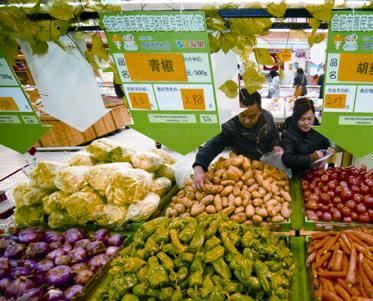No Heavy Blow
2014-02-17ByLanXinzhen
By+Lan+Xinzhen
Starting from January 2014, the U.S. Federal Reserve (Fed) cut its monthly asset buying from $85 billion to $75 billion. To elaborate, the purchase of long-term government bonds has been scaled back from $45 billion to$40 billion and purchasing of mortgage-backed securities has been cut back from $40 billion to $35 billion. The Feds new move signaled a gradual withdrawal from the unconventional quantitative easing (QE) program, which was launched to support U.S. growth after the global crisis in 2008. The QE program aimed to bring down interest rates and encourage investment by buying billions in bonds and other securities. Monetary policy in the worlds largest economy will now be tuned back to conventional policies.
China received large capital inflows because of the QE program, resulting in a higher inflation rate. The countrys central bank had to raise interest rates and increase the reserve requirement ratio to curb inflationary pressure. Now, experts are highly concerned whether or not the end of QE will worsen Chinas liquidity conditions and destabilize the countrys economic growth.
He Liping, a professor of finance at Beijing Normal University, said China upholds a prudent monetary policy in general. He suggested that preventing the U.S. QE exit strategy from destabilizing Chinas financial markets or macroeconomy should be a key goal of Chinas monetary policies in 2014.
Limited impact
Since December 2013, Chinas stock market has witnessed a continuous drop. Analysts suggested this is related to the Feds decision to trim its bond-buying program, as a great amount of “hot money”—speculative capital flows between countries in order to earn a short-term profit—fled from Chinas stock market, leaving behind a pessimistic atmosphere in the market.
He said the pessimism is completely unnecessary. “The U.S. exit strategy will exert a certain impact on China, but wont deal a heavy blow to the Chinese economy, because the United States has a clear logic and timeline in tapering QE.”
He gives two reasons why China need not fear the tapering of the QE program. Firstly, its a mild and gradual exit. Right now, asset purchasing has been cut by only $10 billion a month. This is a decision made after factoring in uncertainties in the U.S. and global economies and fully weighing the impact. Even if the U.S. economy takes an upward swing and economic data meet the required targets, the QE exit will still be mild, He claims.endprint
Secondly, there will be intervals between each cut. Even with rosy economic conditions, the Fed will end QE by the end of 2014 at the current pace of cutting $10 billion each month. Considering downward trends and other uncertainties in the U.S. and global economies, its likely that the Fed wont entirely exit from QE in 2014, He predicted.
Chinas economic growth rate bottomed out in the second half of 2013 and has stayed between 7 to 8 percent, which represents a positive growth trend. China doesnt need massive capital inflow to shore up economic growth, as that kind of growth pattern will bring with it a host of uncertainties, He said.
Wang Yong, a research fellow with CITIC Securities, claims the QE exit will result in an outflow of hot money from the Chinese market.
“If the capital flow reversal happens too fast, it may cause a cash crunch in Chinas capital markets. This will be the biggest impact on the Chinese economy,” Wang said. “Even in that case, the stability of Chinas economic growth wont be compromised as China has hefty foreign exchange reserves that can cushion the impact of any market turbulence.”
Cooling inflation
Lian Ping, chief economist with the Bank of Communications, said the QE exit signals a gradual recovery of the worlds largest economy, which is bound to reinvigorate economies worldwide, including the Chinese economy.
“Hot money outflow from China triggered by the QE exit may be a blessing in disguise when it comes to the long-term health of the Chinese economy,” Lian said.
Hot money outflow can soothe the appreciation pressure on the yuan, thus improving the competitiveness of Chinese exports and offering new growth momentum to the country, Lian said. “Also, the QE exit will ease pressure on the central banks foreign exchange reserves, mitigate inflationary pressure caused by excessive monetary supply and therefore leave room for the central authorities to carry out macrocontrol measures.”
Professor He claimed the Feds monetary policy has always prioritized maintaining a stable economic growth trend, and the Fed will continue to do so in the future.
In the past, He elaborated, U.S. monetary policy was extremely loose because the economy was hit hard by the financial crisis and prevailing pessimism. Therefore, unconventional loose monetary policy was implemented to put the economy back on course, lower the unemployment rate and create inflationary expectations in the market. Without this unconventional loose monetary policy, the U.S. economy could have slipped even further, dragging the global economy into an even worse condition, He said.endprint
Right now, the real economy of the United States is on the mend. Under these circumstances, if QE isnt tapered accordingly, inflation will become an increasingly serious issue. For instance, a price surge in the global bulk commodities market would be unbearable for emerging markets. The QE exit is beneficial for curbing global inflation, He said.
“If QE is ended after the global recovery, it will be too late because by then, global inflation will be far too serious,” He claimed.
Yuan depreciation?
The QE exit will undoubtedly result in a stronger U.S. dollar, but will that bring about the depreciation of the yuan? He said some factors influencing the yuan exchange rate are known to analysts, while some are still uncertain.
The known factors supporting a stronger yuan against the U.S. dollar include Chinas trade surplus, its mounting foreign exchange reserve and a higher interest rate level. Such a high yield is very attractive for global investors, said He.“The uncertain factors include the high leverage rate and alarming local government debt levels. Their influence on the yuan exchange rate is still uncertain right now.”
“One thing is clear. The complete exit of the United States from QE requires the interest rate to be brought back to a normal level,” He said.“Even if the monthly asset purchase is scaled back to zero, it doesnt mean a complete exit from QE. A reasonable interest rate in banks is still required.”
An interest rate increase will be postponed until 2015. Even if it happens, it will be conducted gradually. The Fed has implied even if the unemployment rate falls below 6.5 percent, the low interest rate policy—from zero to 0.25 percent—will be carried out over a long period, He said.
“Therefore, the QE exit will have limited impact on the depreciation of the yuan,” He concluded.endprint
